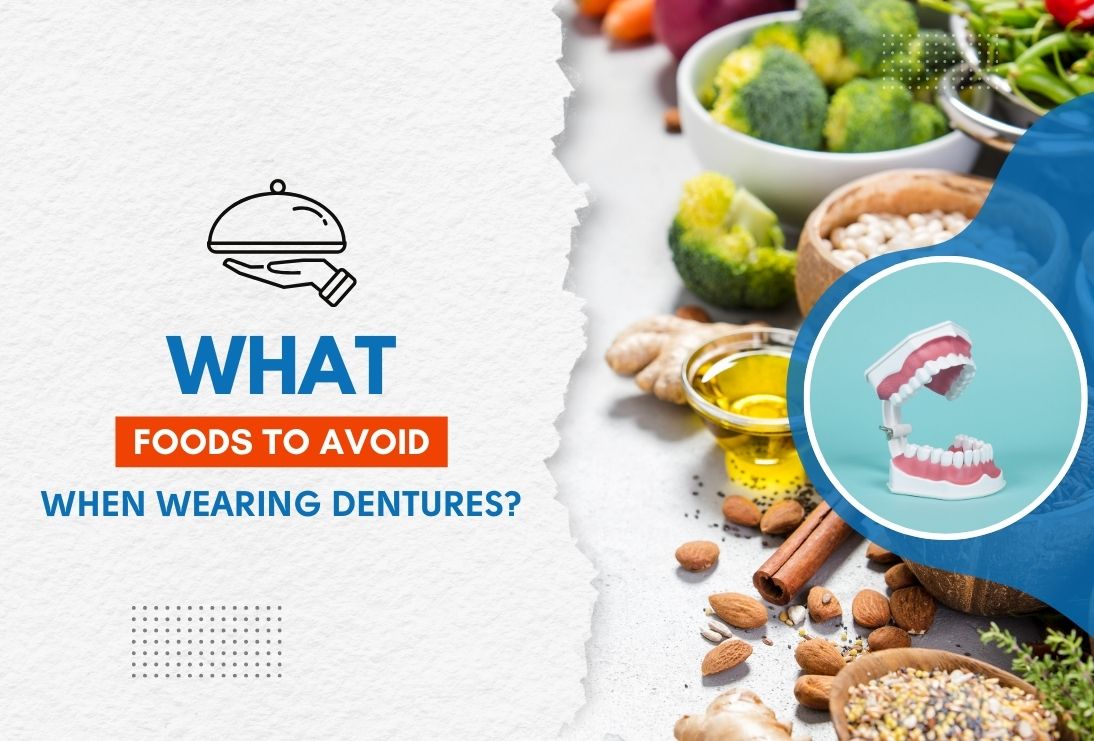
Dentures are an essential part of life for many people who have lost their natural teeth. They provide functionality, aesthetic improvement, and increased confidence. However, maintaining them and ensuring their longevity requires more than just regular cleaning and maintenance. One of the key aspects of proper denture care is being mindful of the foods you consume. Some foods can cause damage to your dentures, make them uncomfortable, or affect your oral health.
In this article, we will discuss the foods to avoid when wearing dentures in Kolkata and why it's crucial to make these adjustments for optimal denture care. At Teeth Care Multispeciality Dental Clinic, we believe in empowering our patients with the knowledge to care for their dental health and prosthetics effectively.
Wearing dentures is different from maintaining natural teeth. While dentures are made from durable materials such as acrylic and metal, they are still susceptible to damage from certain foods. Hard, sticky, or excessively crunchy foods can lead to discomfort, staining, and even breakage of the dentures.
The importance of avoiding certain foods also lies in maintaining oral hygiene. Dentures can trap food particles, leading to plaque build-up and bacterial growth. Consuming foods that are hard to chew or stick to your dentures can also make it difficult to maintain a clean mouth, increasing the risk of gum infections, bad breath, or even inflammation of the gums.
Understanding which foods to avoid can help keep your dentures in good condition, ensuring that they remain functional and comfortable. Below are some common categories of foods that should be limited or avoided entirely while wearing dentures.
Also read: 10 Essential Tips for Maintaining Your Dentures
Hard foods can pose a significant risk to dentures. When you wear dentures, you may not have the same biting power as when you had natural teeth. Biting into hard foods can put excess pressure on your dentures, leading to cracks or breakage. Some examples of hard foods to avoid include:
Hard foods can cause significant damage to both the dentures and the gums. The constant pressure on the dentures from biting into hard foods may lead to cracking, warping, or loosening, compromising the fit and comfort of the dentures.
Sticky foods can adhere to your dentures, making it difficult to remove food particles. If left unchecked, they can lead to the build-up of bacteria and plaque on your dentures, leading to bad breath and potential oral infections. Some sticky foods to avoid include:
Sticky foods are troublesome for denture wearers because they cling to the surfaces of your dentures, requiring you to exert more effort to clean them properly. These foods can also increase the risk of plaque build-up, contributing to poor oral hygiene and potential gum disease.
When you wear dentures, your gums and mouth may become more sensitive to extreme temperatures. Hot or cold foods can cause discomfort and even pain in some cases. You might also experience discomfort if your dentures do not fit correctly, as extreme temperatures can cause them to expand or contract. Examples of foods to avoid include:
Extreme temperatures can cause discomfort for denture wearers due to the way dentures interact with your mouth. The artificial materials in dentures may contract or expand when exposed to hot or cold foods, causing a poor fit. Additionally, the sensitivity in your gums may increase, making it difficult to eat these foods comfortably.
Sugar is one of the primary contributors to tooth decay and gum disease, even if you're wearing dentures. Consuming sugary foods can lead to plaque formation on both your dentures and gums, increasing the risk of oral infections. Some sugary foods to avoid include:
Sugary foods can increase the growth of harmful bacteria in your mouth, leading to plaque buildup on your dentures and gums. This can cause oral issues like gum disease and tooth decay, which can affect both natural teeth and dentures. Additionally, sugary foods can cause staining of your dentures.
Certain foods and beverages can cause your dentures to stain, making them look unsightly. While this may not affect the functionality of your dentures, it can impact your appearance and confidence. Some foods and drinks that stain dentures include:
Staining foods are problematic for denture wearers because they can make your dentures appear dirty or discolored. Regular exposure to staining substances like coffee or red wine can cause permanent discoloration, which may require professional cleaning or replacement.
Certain foods can irritate the gums and make your dentures uncomfortable to wear. Foods with sharp edges or that are too tough to chew may scrape or hurt the soft tissues in your mouth. Some examples include:
Gum irritation can occur when food particles cause friction or abrasion on the gums, leading to soreness or swelling. Foods that are tough, chewy, or spicy can be challenging for denture wearers and can interfere with the comfort of wearing dentures for long periods.
Also read: Do Dentures Look Fake?
Conclusion
Wearing dentures requires a thoughtful approach to your diet. While dentures provide numerous benefits, consuming certain foods can damage them, cause discomfort, and even affect your oral hygiene. To ensure your dentures stay in optimal condition, avoid hard, sticky, sugary, staining, and irritating foods. Additionally, always prioritize oral hygiene by cleaning your dentures thoroughly after every meal.
At Teeth Care Multispeciality Dental Clinic, we are dedicated to helping you maintain the health of your dentures and overall oral health. By making smart dietary choices and regularly caring for your dentures, you can ensure they last for years to come.
If you have questions or concerns about your dentures or need assistance with denture care, feel free to schedule a consultation with our team.